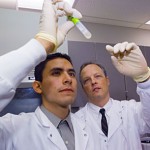 It’s often said that science progresses one death at a time. The saying underlines the difficulty of getting traction for new ideas. Research from Penn highlights that competition can have a beneficial impact on the success of new thinking in the scientific world.
It’s often said that science progresses one death at a time. The saying underlines the difficulty of getting traction for new ideas. Research from Penn highlights that competition can have a beneficial impact on the success of new thinking in the scientific world.
“The current scientific model isn’t working. It’s often dysfunctional and unproductive and sometimes even counterproductive,” the researchers explain. “We make the argument that scholars who care about truth should participate in adversarial collaborations any time their own research contradicts the research of another scholar. My ultimate goal is to improve science as a tool for discovering the truth to help humans flourish.”
Adversarial collaboration
The notion of so-called “adversarial collaboration” was initially coined by Daniel Kahneman, who suggested that “angry science” was largely a waste of effort. He, therefore, looked for an approach that allowed scientists to work together rather than in opposition.
His approach would involve a good-faith effort to carry out joint research, which is a practice he himself practiced a number of times, including in a few with an agreed-upon arbiter to help lead the project and collect the data.
The researchers have been working on their project under the guise of the Adversarial Collaboration Project at Penn, which is housed in the school of Arts & Sciences. They highlight that adversarial collaboration remains rare, due in no small part to the impression people have that it will be a negative experience.
Initial steps
They’ve so far recruited a few dozen researchers to work on 10 studies as part of the Adversarial Collaboration Project, with each covering a unique topic area. By signing up to the project the researchers each commit to something referred to as “conditions of falsifiability.”
“You need to get everyone to say, ‘Here’s a study that we could actually run where it’s possible we could find A or it’s possible we could find B, and if we find B then I agree to at least slightly modify my current perspective,'” they explain.
The neutral third party is often key to making the whole thing work, as that centralized authority can exert pressure on all participants to be reasonable and to take varied perspectives. It’s an approach that they’re confident could work in most research disciplines, although they do caution that it could still be challenging in domains with high policy stakes with political tribalism attached.
“It comes down to the question of, What is science? Science ceases to be science if the parties to the debate have asymmetric standards of proof, if they fear the error of falsely rejecting a hypothesis more or less than the error of accepting a false hypothesis—and if they reserve the right to move the goalposts of proof whenever convenient,” they explain. “That’s difficult to resolve empirically. It’s a moral rather than a scientific commitment, and I’m not sure how you move through that.”